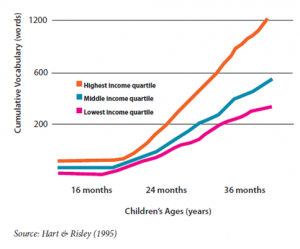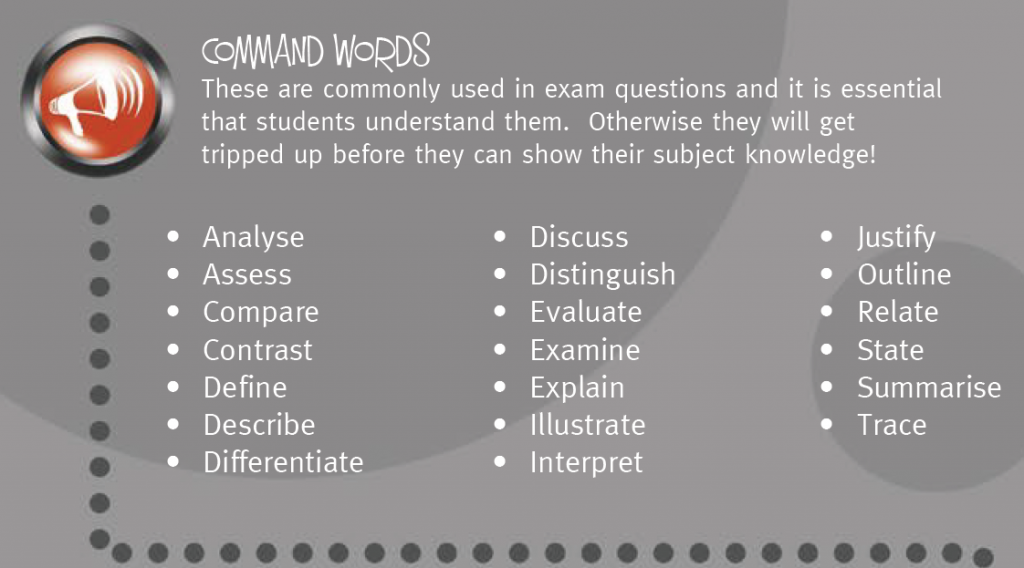“Learning, as a language based activity, is fundamentally and profoundly dependent on vocabulary knowledge.” *
This is the first in a series of posts about vocabulary. Some practical teaching ideas will follow. Here, I discuss the necessity for a focus on vocabulary as a method of ‘closing the gap’.
‘The Matthew effect’, coined by the sociologist Robert K Merton, is the idea that the rich get richer and the poor get poorer. This is certainly the case with students’ vocabulary. Hart and Isley’s study suggests that those in lower socio economic classes begin school knowing fewer words than their peers and that gap gets larger throughout their education. “Differences arise early, and the vocabulary gap between students grows larger over time”. (Baker, Kameenui 1998) A reasonable estimate would be to say that at the end of secondary school, high performing students know about 4 times more words than their lower performing peers.

In order to explore why this gap increases, it is important to understand how we build knowledge. According to Daniel T. Willingham, the more we know, the easier it is for us to take on new information. Our ‘working memory’ is the place where we store new ideas and our ‘long-term memory’ is where we keep our knowledge. The more students can access knowledge from their long-term memory, the more space they have in the working memory for working with and processing new knowledge. “…background knowledge allows chunking, which makes more room in working memory, which makes it easier to relate ideas, and therefore to comprehend.” (From Why Don’t Students Like School)
Steven A Stahl states, “Vocabulary knowledge is knowledge; the knowledge of a word not only implies a definition, but also implies how that word fits into the world.” When we are dealing with vocabulary, we are merely dealing with a particular kind of knowledge.
Now, suppose two students are tackling a challenging text. The word-rich student will only need to juggle perhaps one or two new words whereas the student who knows fewer words will have to keep several new words and concepts in their working memory. The former student is much more likely a) to comprehend the text and b) add the newly introduced words to their vocabulary. More vocabulary begets more vocabulary.
There is a strong correlation between vocabulary and reading comprehension. It makes sense that those with a richer vocabulary would understand a text. This will also depend on the depth of vocabulary knowledge as well as the breadth. There is also a reciprocal relationship between vocabulary and reading comprehension. Students who know more vocabulary will read more and those who read regularly will build their vocabulary. The adverse is true- those with poor vocabulary will read less. Vocabulary rich readers learn more words than vocabulary poor readers from the same amount of reading which is then compounded by the fact that those word-poor readers go on to read less.
It isn’t just about reading- a wider vocabulary is helpful for students to be precise in their meaning. It is possible to be understood with a fairly limited vocabulary- I can get by in France because I have a basic French vocabulary. (See the Up-goer 5 project and this article for an idea of how we can communicate with only a basic vocabulary.) However, think of the synonyms of a word like ‘sad’: depressing, gloomy, miserable, cheerless, distressing, heart-breaking, poignant. None of them are true synonyms- they all offer degrees of meaning. This kind of precision is essential in writing and in thinking. To get the level of sophistication required for academic success, students need the vocabulary to deal in these degrees of meaning.
Because of the uncertainty of any causal link, it is difficult to come up with the definitive way of making students learn vocabulary. E.D. Hirsch states that ‘the fastest way to gain a large vocabulary through schooling is to follow a systematic curriculum that presents new words in familiar contexts, thereby enabling the student to make correct meaning-guesses unconsciously’. He is against the memorizing of word lists etc. He explores his ideas on vocabulary at length here and I would thoroughly recommend reading it.
There are arguments in favour of more direct vocabulary instruction, however. The method above may not always be the most helpful for students who are ‘word poor’ and there may be a need to spend time explicitly teaching vocabulary. Indeed, we cannot rely on students always being able to make these ‘guesses’. For example, the ‘command words’ below would likely need to be explicitly taught rather than discovered.
In practice, I think that we should explore a range of strategies to close the vocabulary gap:
- Explicitly pre-teach the vocabulary that will allow understanding of texts
- Focus on words which can be used in a variety of contexts
- Revisit vocabulary in a variety of contexts
- Encourage wider reading of texts (I think there is an interesting debate here about whether students should read books within their ZPD as they would do in a program like Renaissance Reading or just read whatever they want)
- Provide a word-rich environment including written language, oral language and classroom display
- Explicitly plan opportunities for vocabulary discussion
* From ‘What Reading Research Tells Us About Children With Diverse Learning Needs’: Baker, Kameenui 1998
More on vocabulary:
Unfamiliar Words Part 1: Context
Unfamiliar Words Part 2: Dictionaries and Word Parts

NOTE: On reflection, and after a couple of responses on Twitter, I have removed one of my original bullet points. ‘Teach students the meta-cognitive skills to understand vocabulary’. 1) ‘Strategies’ would have been a better word than ‘meta-cognitive skills’ and 2) When I thought about the strategies students need to work out the meaning of unfamiliar words on their own I could not list any that did not already require a knowledge of vocabulary and which would be particularly helpful to these word-poor students. The strategies we can recommend to work out the meanings of unfamiliar words require students to know more words- which is the problem in the first place!
Great post Mark. This year my timetable has 1 “literacy” lesson on it and I know a few of the pupils in my class have been frustrated that the books they want to read fall into a different ZPD level that their own.
I find vocabularly is key to learning in Maths also, especially the way the GCSE questions are being phrased these days. We have been pushing maths based literacy a lot this year.
[…] The vocabulary gap […]
[…] The vocabulary gap […]
[…] The vocabulary gap […]
[…] The vocabulary gap […]
Have you read Bringing Words to Life by Margaret Beck? I think you’d like it.
Yes- I read it when I was researching this post and the others. I’d also recommend ‘Creating Robust Vocabulary’ by the same authors and ‘Teaching Word Meanings’ by Stahl and Nagy.